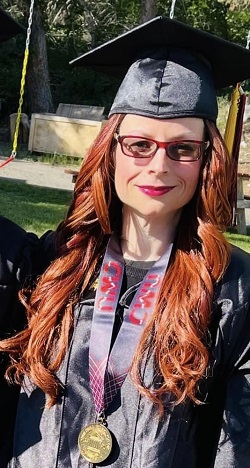Spotlight: Adjunct Faculty April Tedder
 “I want to help other people who can’t believe in themselves. I want to be that
person who believes in the student and fosters the seed of education. “- April Tedder
“I want to help other people who can’t believe in themselves. I want to be that
person who believes in the student and fosters the seed of education. “- April Tedder
April Tedder’s path as a part-time adjunct faculty member can be compared to a long winding road, full of stops and different scenery but laser focused on the designation.
Although Tedder is a newer addition to the Wenatchee Valley College faculty, beginning in October 2021, she is not new to WVC.
Tedder first came to WVC as a 38-year-old student and started her academic career in Transitional Studies High School Plus program. That is the program that focuses on Adult Basic Education. She always knew she was going to attend college but struggled. For 20 years, she worked on earning her high school diploma with undiagnosed learning disabilities and unsupportive family.
“I would go to class and try and try, but I could not keep up with the other students,” Tedder shared. “I viewed my disability as a deficit--as though something in me was broken. It was not a positive feeling. My teachers were often frustrated with me.”
One teacher encouraged Tedder to drop out and that was exactly what she did in 9th grade.
Fast forward to a marriage and four children later, with many obstacles along the way, Tedder’s education was always put on the back burner. But, her drive to continue her education stayed strong.
During this time, Tedder learned to navigate around the education hole. She was ultimately confronted with her lack of diploma when she volunteered for the Sheriff’s Department and Fire Department. They required a diploma because the state checked all education credentials. Tedder knew to continue, she needed to go to WVC to complete her diploma.
Wenatchee Valley College was offering the new High School Plus program. Students in the program complete classes much like a traditional high school model to receive their high school diploma, not just a GED. Students can also receive credits for life and work experience to complete some of the requirements. Tedder started this program with 8 of the 21 credits required for completion.
“At the encouragement of a teacher, I was finally tested and diagnosed with ADHD, dyslexia, dyscalculia,” said Tedder. Dyslexia changes sentence structure and letter placement which makes it necessary for people to read information slowly and multiple times to process. Dyscalculia makes learning math related concepts and processes difficult. Tedder is unable to move between concepts quickly and struggles with mathematical organization. Most students can do mental math or use a form of short-hand in algebra, but someone with dyscalculia, the brain requires everything to be written out in a linear fashion. Overall, dyscalculia makes it extremely hard to do algebra.
While in the High School Plus program, Tedder received accessibility accommodations for her disabilities. With these accommodations, she completed the remainder of her high school credits in three quarters.
“The biggest lesson I learned in the program was how to believe in myself,” stated Tedder.
Now, Tedder teaches two classes in the department where she once was a student. Tedder’s favorite part of working at WVC is interacting and mentoring students. As a mentor, Tedder connects students with resources on and off campus to help remove barriers to success. Based on her own experience, she often shares strategies for studying, shares tip to overcome hurdles, and explains challenges that can compound with outside factors.
Outside of work, Tedder is a full-time student pursuing a masters of social work degree with a focus in mental health. She is even looking ahead to potential doctoral programs in organization development and leadership.
As Tedder pursues continued higher education, her sons are following her path of attending WVC and higher education. “Education is transformative - it changes individuals, families, communities, and even systems!” Tedder shared. “Education has changed my entire family - how we see each other, our goals for the future and our role within society.”


